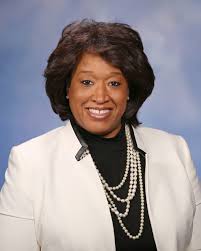The race to replace former Dean of the House John Conyers Jr., who angrily resigned in December after a series of sexual harassment allegations, promised to be a rollicking free-for-all.
And so far, it hasn’t disappointed.
When all is said and done, more than a dozen Democrats could appear on the August ballot for the Detroit-based 13th congressional seat. And to add to the confusion, many, if not all, will appear twice — once for the special election to fill the remainder of Conyers’ term and another for the next term starting in 2019.
So far, most attention has been on the two men named “Conyers” vying for the seat, but there’s another important story of African-American women yearning for more representation.
In its typical snarky style, Vice noted how Michigan’s penchant for dynasties could play a role in not just the open 13th, but the 9th district this year: “Lord Conyers of Highland Park [sic] has two relatives trying to replace him; and retiring Representative Sander Levin (brother of former Senator Carl Levin and resident of perfectly named Royal Oak) is trying to get his son Andy to win the nomination for his old seat.”
Right before tendering his resignation, Conyers endorsed his son, John Conyers III, a hedge fund manager and political novice. The scion’s campaign isn’t subtle — his committee is titled “Conyers to Conyers.” After his father’s historic civil rights career ended in scandal, the younger Conyers could bring more of the same to Congress, as he was busted for driving a taxpayer-funded Escalade and arrested in 2017 for domestic violence.
State Sen. Ian Conyers (D-Detroit), has also declared. The congressman’s great-nephew, who won a special election in 2016, was considered leadership material in the Legislature. He’s also been an ally of Detroit Mayor Mike Duggan, but failed to earn his blessing this time around.
Instead, Duggan, fresh off a thunderous re-election, just threw his weight behind Detroit City Council President Brenda Jones, with whom he’s worked on rebuilding Detroit post-bankruptcy. They mayor’s early endorsement — before the field has even been set — sends a message to rivals and key organizations that Jones is the favorite. TV Judge Greg Mathis, who briefly flirted with a bid, is on board. Look for the UAW to follow suit.
Jones is a logical standard-bearer. She’s the former president of Communications Workers of America, Local 4004 and won the National Organization for Women’s Sojourner Truth Award. Jones has pledged to uphold Congressman Conyers’ civil rights legacy and fully restore the Voting Rights Act.
She would also join U.S. Rep. Brenda Lawrence (D-Southfield) as the second African-American member of Michigan’s congressional delegation (and, as it stands now, she’d be only the third woman). Many politicos, by the way, underestimated Lawrence in the open 14th primary back in 2014. Her longtime adviser, Christy Jensen, who’s one of the savviest Dems in Michigan, now works for Jones.
Two other African-American women have declared in the 13th and it’s no coincidence. They’ve been leading the resistance against President Trump, after 94 percent voted for Hillary Clinton in 2016. In last year’s special Alabama U.S. Senate election, 98 percent of African-American women voted for Democrat Doug Jones, putting him over the top in the blood-red state.
“Black women are the backbone of the Democratic Party, and we can’t take that for granted. Period,” Democratic National Committee Chair Tom Perez said after the Alabama election.
But many black women still feel taken for granted. Many Democrats remain obsessed with winning back working-class white men and sneer at “identity politics.” There’s never been an African-American female governor in the nation. U.S. Sen. Kamala Harris (D-Calif.) is only the second black woman to serve in the body. And there are just 19 African-American women serving in the U.S. House.
State Rep. Sherry Gay-Dagnogo (D-Detroit), a former educator, is also running in the 13th. But she has some baggage as a fiery defender of Conyers and one of only 11 representatives to vote against a resolution calling for Michigan State University President Lou Anna Simon to resign over the Dr. Larry Nassar sexual abuse scandal.
Former state Rep. Shanelle Jackson (D-Detroit), who lost her primary bid to Conyers in 2012, is set to run again. She’ll face blowback for her job as director of government relations for the Moroun family’s Detroit International Bridge Company, whose business and environmental policies have long rankled progressives.
One of them is former state Rep. Rashida Tlaib (D-Detroit), who just declared for the 13th and won’t be shy about banging on the Morouns or her other foes, like Duggan. She’s also a master at getting media attention. In 2016, more than a dozen protesters were tossed out of Trump’s speech at the Detroit Economic Club, but the only name anyone ever remembers is Tlaib’s.
She would be the first Muslim woman elected to Congress. But although Tlaib won three terms representing a majority African-American district in the state House, it remains to be seen if she can muster the same support for a far larger congressional seat.
Everyone is always looking for political analysts to whip out their crystal ball and definitively declare winners. That’s always a recipe for folly.
That’s especially true in the diverse 13th, which features two concurrent elections with so many candidates and dynamics. Anyone who tells you they know how this one will end is lying.
Susan J. Demas is Publisher and Editor of Inside Michigan Politics, a nationally acclaimed, biweekly political newsletter. Her political columns can be found at SusanJDemas.com. Follow her on Twitter here.
















